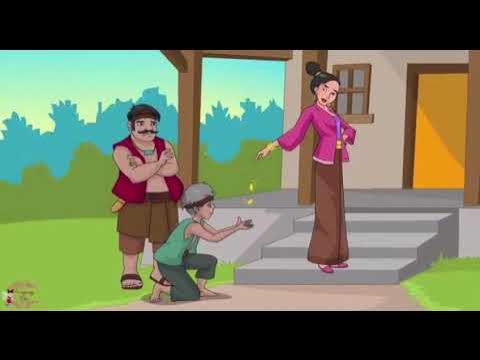THE LEGEND OF THE TWO WOLVES || Native American Legend
Summary
TLDRThe Cherokee legend narrated by an elder to his grandson illustrates an internal battle between two wolves representing the forces of good and evil within each person. The elder explains that the wolf that prevails is the one we choose to feed with our actions and attitudes. The story emphasizes the importance of nurturing positive emotions and virtues to achieve true happiness and progress in life.
Takeaways
- 🐺 The story conveys a metaphor about the internal struggle between two aspects of human nature: one representing negative traits and the other positive virtues.
- 👶 The dialogue is between a wise Cherokee elder and his grandson, symbolizing the passing of wisdom from one generation to the next.
- 🔥 The 'war' mentioned is an allegory for the ongoing battle within each person between good and evil tendencies.
- 😈 The 'evil wolf' embodies negative emotions and traits such as anger, greed, and ego.
- 😇 The 'good wolf' represents positive attributes like love, hope, and compassion.
- 🤔 The grandson's question about which wolf will win highlights the uncertainty and choice each individual has in their moral and emotional development.
- 📚 The elder's answer, 'the one you feed,' teaches that personal growth depends on nurturing the positive aspects of one's character.
- 🚶 The script emphasizes that true progress in life is not just about physical movement but also about emotional and spiritual growth.
- 🏞 The importance of one's attitude towards others is highlighted as a key factor in determining one's happiness and the quality of life's journey.
- 💔 Holding onto negative emotions like anger and grudges is portrayed as a hindrance to personal development and happiness.
- 🔄 The message concludes with the idea that to move forward in life, one must leave behind what holds them back, reinforcing the need for self-improvement and letting go of negativity.
Q & A
Who is the main character in the legend shared in the transcript?
-The main character in the legend is a wise Cherokee elder who is teaching his grandson about life.
What is the central metaphor used by the elder to describe the internal conflict within a person?
-The central metaphor is the 'war between two wolves,' representing the struggle between good and evil within a person.
What are the qualities attributed to the 'evil wolf' in the story?
-The 'evil wolf' represents anger, envy, jealousy, sorrow, regret, greed, arrogance, self-pity, guilt, resentment, inferiority, lies, false pride, superiority, and ego.
What are the qualities attributed to the 'good wolf' in the story?
-The 'good wolf' embodies joy, peace, love, hope, serenity, humility, kindness, benevolence, empathy, generosity, truth, compassion, and faith.
What does the elder tell his grandson about the outcome of the war between the two wolves?
-The elder tells his grandson that the wolf that will win is the one that is fed, implying that one's actions and focus determine which aspects of their character prevail.
How does the elder relate the internal war to the grandson's life journey?
-The elder explains that the internal war is a reflection of how one's heart is moved and that the journey of life is not just about physical movement but also about emotional and spiritual growth.
What is the significance of the elder's statement about walking far but being angry toward others?
-The elder's statement emphasizes that if one is angry or holds grudges, they effectively make no progress in their spiritual journey, even if they seem to be moving forward physically.
What lesson does the elder impart about the importance of how we perceive others?
-The elder teaches that our perception of others greatly influences our happiness and the quality of our life's journey, suggesting that seeing others as enemies or with negativity hinders our progress.
What advice does the elder give regarding leaving behind what holds one back?
-The elder advises that to move forward, one must leave behind anything that invites backward walking, symbolizing the need to let go of negative influences and emotions.
How does the legend conclude, and what is its ultimate message?
-The legend concludes with the message that the outcome of the internal struggle depends on the choices one makes, feeding the 'good wolf' with positive actions and attitudes.
Outlines

هذا القسم متوفر فقط للمشتركين. يرجى الترقية للوصول إلى هذه الميزة.
قم بالترقية الآنMindmap

هذا القسم متوفر فقط للمشتركين. يرجى الترقية للوصول إلى هذه الميزة.
قم بالترقية الآنKeywords

هذا القسم متوفر فقط للمشتركين. يرجى الترقية للوصول إلى هذه الميزة.
قم بالترقية الآنHighlights

هذا القسم متوفر فقط للمشتركين. يرجى الترقية للوصول إلى هذه الميزة.
قم بالترقية الآنTranscripts

هذا القسم متوفر فقط للمشتركين. يرجى الترقية للوصول إلى هذه الميزة.
قم بالترقية الآنتصفح المزيد من مقاطع الفيديو ذات الصلة

(Personal Development) LESSON 2 - DEVELOPING THE WHOLE PERSON

The Real Story of The Two Wolves

[ENG SUB] Built to Commemorate King Anusapati, This Temple Inspired Indonesia's National Emblem

"How Mindfulness Empowers Us" An Animation Narrated by Sharon Salzberg

2024 Best TURKISH Horror Movie - SICCIN 7 (2024) Explained In Hindi | Real Story Based ZULMAT RITUAL

Dongeng Sasakala Situ Bagendit ( Tugas Bahasa Sunda)
5.0 / 5 (0 votes)
